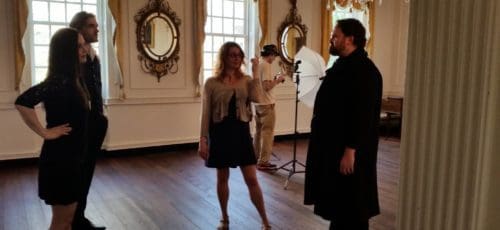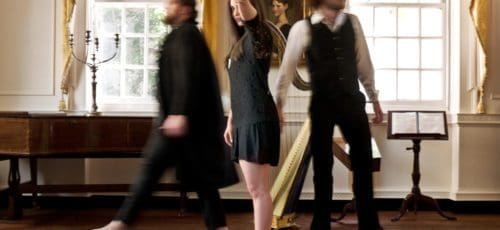What’s More Fringe than Opera? Q&A with Michael Leinard of “Opera Macabre: Edgar Allen Poe”
 Opera! One of the world’s great mysteries. OK, not really, but it seems opaque to lots of folks. So we caught up with Michael Leinard of the 2013 FringeArts production Opera Macabre: Edgar Allen Poe, and demanded he justify its existence. Much to our surprise, he was not angered. We think. Opera Macabre opens tonight and runs September 14, 15 and 19 at The PlayGround at the Adrienne. Times vary, $15 to $20.
Opera! One of the world’s great mysteries. OK, not really, but it seems opaque to lots of folks. So we caught up with Michael Leinard of the 2013 FringeArts production Opera Macabre: Edgar Allen Poe, and demanded he justify its existence. Much to our surprise, he was not angered. We think. Opera Macabre opens tonight and runs September 14, 15 and 19 at The PlayGround at the Adrienne. Times vary, $15 to $20.
How did you guys get started?
Reese Revak and I have been friends since our undergraduate studies. Right before our Master’s programs were to begin, Reese and I were becoming disillusioned with what we were seeing in the operatic world. After complaining a lot and being admittedly pushed by Felipe Vergara and Alison Hoban (both founders of Found Theater Co.) decided that we should focus on what we believe opera should be and form our own company.
The Philadelphia Opera Collective was founded on the principle that opera is an accessible and honest expression of human emotions. The music will always be there, the beauty will always be there, but the DRAMA is often what is ultimately lost. It is for this reason that we focus on American opera, in English, and perform in intimate spaces.
Why opera? Justify its existence.
Well, it was once of the most popular forms of entertainment IN THE WORLD! Opera singers were (and in some countries still are) respected as vocal Olympians – able to sing higher, lower, softer, louder, faster, longer than anybody. Now, it is often ripe for parody. People don’t realize that while yes, there were plenty of operas written about mythological subjects and had women in Viking helms, there are just as many operas written about the common person. We believe that opera is honest and that it is visceral. At the times when most popular opera was written it was accessible, but now we must focus on what opera means to us in 21st century rather than rehashing time and time again same operatic canon. In a country were La Boheme is performed 1000s of times each year, we need to reach out and say “there is more than that. Trust us.” I mean, sure the stereotypes are fun. But opera is much, much more than that. We focus on proving that opera is not simply an empty spectacle.
What attracted you to Poe?
Well, who isn’t attracted to Poe? What happened is that Reese and I were talking over a few drinks about Found Theater Co. method of using devised works after seeing Electric Jungle in last year’s Fringe. I jokingly suggest that it would be fun to do a devised opera… people do it all the time, it just needs to be approached in the right manner.
He and I both love the short stories of Edgar Allan Poe and decided that it would be the perfect subject matter for an opera. His life was, after all, really quite operatic. He knew how to take a simple story like: man hates wife. Man kills wife. Man is caught by police after a blunder in hiding the body – into a stomach churning tale that leaves the reader gasping for air. We wanted to bring that aspect to the work. We focused on The Fall of the House of Usher and The Black Cat for this project. We felt that Usher was so languid and gothic that it was the perfect juxtaposition for the black comedy that is The Black Cat. To put it simply, the combination will give Poe fans, opera buffs and theater goers everything they could possibly want in one nice and neat little package.
Usher is, as previously stated, a lurid drama in Poe’s signature gothic style. The music has long, lush lines that spin out into the ether and leave you thinking – “ah yes, this is Poe.” Our intermezzo channels the spirit of the Poet through Poe’s letters on good writing and that leads us perfectly into the Black Cat. This is a fun romp with accordions, puppets, and a vaudeville feel to it that will be a breath of fresh air.
To work on the project I teamed up with Alison Hoban of Found Theater Co. to compile and arrange the text for Black Cat, Isabel Lowney Brouhard (from the Collective) and did the same for Usher, and Brenna Geffers and Ross Beschler wrote the libretto for an intermezzo called Music of the Sphere’s that is based on Poe’s letters about what it takes to be a successful writer. We would then forward all this text to Reese Revak, who would then provide the music.
Brenna Geffers is one of my favorite Philadelphia directors, but I’ve only seen theater projects by her–what was it like working with her on an opera?
Brenna Geffers should be one of everybody’s favorite directors! She approached us after hearing of our mission statement which defines that opera should be accessible and drama driven and confessed that she had always been interested in working on an opera. Opera Macabre marks her third show with the POC and we cannot be more delighted. Having one of Philadelphia’s most widely recognized and edgy directors taking and interest in our company is such a blessing for us. She draws visceral and heart rending stories out of our singers that pushes us out of our comfort zones in the best way possible. She wants to push opera’s boundaries and we cannot agree with her enough. In rehearsal she does not focus on the music, nor does she coach us on our music, instead she concentrates on our text. She helps us get out of our own way by getting to the meat of the stories at hand. We recognize that opera is a highly stylized art form and often times she does not shy away from this thought. We create beautiful tableaux, enter seamlessly in and out of dream sequences and of course sing opera. She continually nurtures and pushes us in the best way imaginable while creating undeniably beautiful art.
Do you think you have an angle to attract new audiences to opera?
Our angle is that we are not your grandmother’s opera company! You do not need to adhere to any strict dress code, nor do you need to worry about unreasonable ticket costs. Our operas are in English, they are in small spaces where you can really see the drama play out. Every year we have people come because we tout that our opera is relatable. And every year those people leave our venues thanking us and saying things like “I never knew that I would like opera this much.”
–Nicholas Gilewicz


